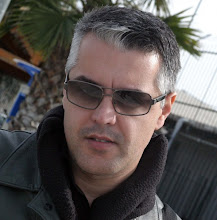"Αποσχιστικό" κίνημα βλέπει να δημιουργείται στην Κέρκυρα,η βρετανική εφημερίδα Gardian!!!
Κατά το "ρεπορτάζ" της ανταποκρίτριας της βρετανικής εφημερίδας Helena Smith
"πολλοί κάτοικοι του νησιού νιώθουν τόσο απογοητευμένοι από το γεγονός ότι το ελληνικό κράτος παραμελεί την Κέρκυρα και ότι οι Έλληνες πολιτικοί είναι "απόμακροι και διεφθαρμένοι", ώστε σύστησαν κόμμα με σκοπό να συμμετάσχει στις επόμενες βουλευτικές εκλογές.
Δέσμευση του κόμματος των Κερκυραίων είναι η άσκηση πίεσης για τη διενέργεια δημοψηφίσματος, ώστε η Κέρκυρα να αυτονομηθεί".
Η εφημερίδα φιλοξενεί δηλώσεις επιχειρηματιών του νησιού που υποστηρίζουν την αυτονομίας της Κέρκυρας, οι οποίοι δε διστάζουν να χαρακτηρίζουν την ένωση με την Ελλάδα ως την "πιο μαύρη μέρα στην ιστορία του νησιού".
Η Helena Smith αναφέρει ότι "οι υποδομές του νησιού όπως το οδικό δίκτυο και μέρη όπως το Μον Ρεπό και η πόλη της Κέρκυρας έχουν παραμεληθεί επί χρόνια".
Σημειώνεται ότι η "είδηση" αυτή έχει ήδη αναρτηθεί στην ιστοσελίδα του ΣΚΑΙ και σε αρκετά blogs.
Το δημοσίευμα της Gardian
Nearly 150 years after it was united with Greece, unrest is mounting on Corfu, the country's premier tourist destination, amid unprecedented calls for autonomy from Athens.
With the embattled Greek government ensnared in scandals barely a year after its re-election for a second term, disquiet is growing on the island.
Dissent is such that community and business leaders enraged with the wayward practices of politicians they see as distant and corrupt have set up a party to press for self-rule.
Meeting in Corfu's elegant Venetian town this week they vowed to compete in local elections in two years' time, to hold a referendum on the issue and, if need be, seek recourse in the EU.
"These things are anathema to say but the truth is that unification with Greece was the darkest day in our history," said Harry Tsoukalas, a prominent entrepreneur behind the autonomy movement.
"It was a huge mistake that we have regretted ever since." While those on the island had pumped billions of euros into the Greek economy through taxes they had received little in return, he added.
The island's infrastructure had deteriorated through years of neglect. Its road network - originally built by the British and seen as a feat of engineering - had become pot-holed death traps with more tourists dying on them every year.
Mon Repos, the one-time palace and birthplace of Prince Philip, the Duke of Edinburgh, had been allowed to fall into disrepair; Corfu Town, a protected Unesco heritage site, had been left to rot in the face of official indifference while the island's heartland, once the inspiration for painters such as Edward Lear, resembled a war zone of discarded cars and rubbish, he said.
Instead of funding badly-needed public works, EU monies were being used to line the pockets of greedy politicians, the autonomists say. "Corfu, the golden goose, has provided up to 20% of central government's revenue but central government takes the golden eggs and doesn't feed the goose," lamented Tsoukalas, who airs the grievances on a TV show he hosts weekly. "People are saying 'enough is enough' and for the first time we are raising our voice. We're not afraid to speak out."
Closer to Italy than any other Greek territory, Corfu was ceded to Greece by the British in 1864 amid great jubilation on the island and in Athens. But the euphoria gradually turned to anger when the former protectorate British-built institutions, including its fabled Ionian Academy, were dismantled. "There is a feeling that we have been completely abandoned by the Hellenic republic," said Dr Spyros Giourgas, a local physician.
"It's unacceptable for example that in 2008 on an island with 150,000 people, including 12,000 resident Britons, we still don't have a hospital and newborn babies die as a result. There's great displeasure. In the coffee shops you hear talk of independence, of people wanting to raise the flag of the Republic of Corfu."
Less than 200 years after Greece was carved out of the Ottoman empire - an empire that Corfu and the rest of the westerly Ionian islands escaped under Venetian rule - issues that touch on national identity, like this, remain hugely sensitive. "Any talk of autonomy is a stupidity, a nonsense," said Nikos Dembias, a local MP with the governing New Democracy Party. "There is nothing to talk about."
But the disgruntlement mirrors mounting disillusionment with mainstream parties in Greece. It also reflects growing regional anger over Athens' highly centralised government and the way it manages its island policies in general.
On Corfu local discontent peaked earlier this year when deadly riots erupted over the location of a waste dump on the island. A young mother of two was killed when riot police, dispatched by the Greek government, moved in.
"It was symptomatic of the contempt with which the Greek government regards Corfu," says Tsoukalas. "Not even during the military dictatorship did Athens send riot police to our island and for many it was the last straw."
Backstory
Corfu was first mentioned by Homer as the homeland of the mythical Phaiakes, whom he described as a peaceful, prosperous and happy people. Its turbulent history has been dominated by its strategic location at the entrance to the Adriatic Sea.
In 1797 after Napoleon had brought about the collapse of the Venetian republic, it was ceded to France. A brief eight-year period of Russo-Turkish rule followed before the Ionian islands were handed over to the French empire again until 1814, when Corfu became part of a British protectorate. The island remained under British rule until 1864 when it was handed to Greece in return for the election of a British-backed candidate to the Greek throne.
http://www.guardian.co.uk/world/2008/sep/26/greece
Εγγραφή σε:
Σχόλια ανάρτησης (Atom)

















Δεν υπάρχουν σχόλια:
Δημοσίευση σχολίου